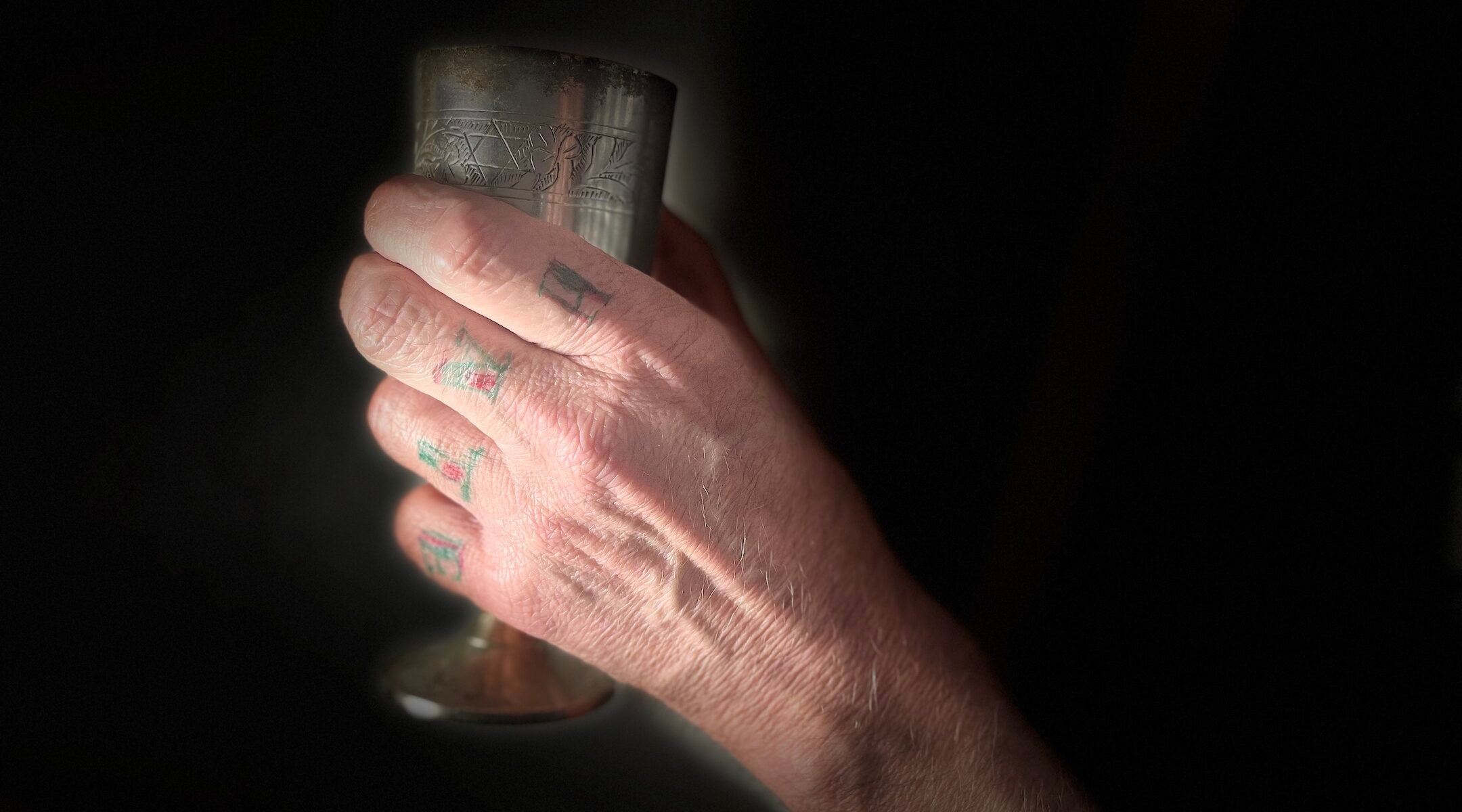Before I drove to meet a convicted antisemite, I carefully tucked my ancestral silver kiddush cup into my coat pocket. I needed him to see something Jewish and beautiful. Then I entered an uncertain and frightening space.
I am a volunteer with the Reconciliation Education and Counseling Crimes of Hate, a victim-centered restorative justice pilot program for offenders convicted of hate crimes. Known as REACCH, the program was established in 2022 by the office of Los Angeles County District Attorney George Gascón to give hate crime offenders the opportunity to atone.
Rather than serving a prison sentence, offenders instead enroll in probation and participate in one year of counseling, anti-bias education and victim reconciliation in a controlled setting. Towards the end of the program, the offender meets a “peer victim” — if not the direct victim of the crime, then someone from the same group — to address their own crimes and seek reconciliation. The theory is that offenders who are educated about the consequences of their hate crime will be less likely to commit another one.
I am the first Jewish person to participate as a REACCH peer victim. I have personally experienced antisemitism and as a Jew in America, I do not feel safe. I decided to volunteer for the program because I knew in my heart that some of the people who I think of as monsters must regret what they have done, and thought maybe it would heal me and heal them if we could meet.
I met Robert in a small private conference room in Los Angeles. (This is a pseudonym because I cannot share the offender’s real name.) Upon entering the room, he shook my hand and I quickly noted his reddened eyes and his distressed, clenched jaw. We sat down across a small, bare table.
I reached into my coat pocket and carefully placed my grandmother’s kiddush cup in between us on the table. In such a sterile, confined space the cup brightened the room. I watched Robert look upon it with curiosity.
Robert began to share his story. Over the course of three hours in that room, I learned a valuable lesson: Some hate crime offenders indeed can feel remorse.
Robert was not the monster I expected to meet. He also was not born hating Jews.
I learned he experienced years of personal and professional hardships. Over time, these moments wrecked Robert’s self-esteem and mental health. Without having access to a peer network or a therapist, Robert bottled up his anger at the world and began to see nuanced issues in black and white.
Everything changed when Robert discovered antisemitic conspiracy theories on social media. Suddenly he could point to a singular source outside of himself for his problems, believing it was the Jews who were collectively responsible for his lifelong hardships. His destructive thoughts led him to commit a hate crime.
Though the antisemitic period in Robert’s life was short, it devastated my community. I remember when Robert’s hate crime shook me and my community. I was scared. Like previous antisemitic attacks that rattled my sense of safety, I worried that this was the spark that would light the powder keg of hate against me and my people.
After law enforcement arrested Robert, he sat inside a cell and took time to reflect. By understanding the gravity of his criminal sentence, he told me, he started to grasp the harm his crime had on the Jewish people.
I stared at Robert sitting across from me and wondered whether I should be scared or angry. I couldn’t help but feel sadness for my Jewish community and even some sympathy for him.
Robert started crying. His eyes were red from tears. He confessed he learned something quite sobering during his therapy sessions: He could never take away the pain and anxiety he had caused to the victims of his crime — no matter how much good he did for the rest of his life. But he came to realize that he could make a change in himself and that he could start affecting the world in a positive way.
It brought me a measure of relief and hope to see him seek forgiveness from me, but it was also troubling for me as a Jew to watch him hold so much self-hatred over his own actions.
In the end, I told Robert that it was okay to forgive himself. I was absolutely certain that he was remorseful and understood the impact of his crimes. I also knew that if Robert held onto his self-hatred, it would not right the wrongs of this broken world.
The REACCH program helped me recognize that hate crime offenders are humans and can have the capacity to feel remorse and seek atonement. Although it was easier to imagine every antisemite as a cold-hearted monster out to target me, this experience brought me a measure of calm and hope, because I saw that change was possible. My experience was not unusual: Research shows that programs like REACCH tend to have a positive psychological effect on victims.
The experience also led me to wonder how many other hate crime offenders are decaying in prison for decades and may likewise feel remorse. According to the FBI’s latest figures, law enforcement agencies reported over 11,000 hate crimes incidents in 2022 alone. I choose to believe there must be countless numbers of offenders who are sitting in prison today wishing they had a chance to apologize and work with a therapist to uncover the roots of why they took up hate. Unfortunately today there are too few opportunities for these offenders. Nor is there this opportunity for the victimized community to do much with their pain.
Instead, the typical approach to prosecuting hate crimes may actually make communities less safe. Today, convicted hate crime offenders who are sentenced to prison are likely to be surrounded by white nationalists who have the capacity to indoctrinate newcomers into violent gangs. For the offenders who regret their crimes or could be helped to, how are these conditions possibly helping them rehabilitate?
At the moment, REACCH is a small pilot program in need of permanent funding, and so I challenge all of us to think big for a moment: By investing into models like REACCH, what could the future look like?
I wager that in a few months Robert will be speaking to audiences about the dangers of antisemitic conspiracy theories. After looking him in the eye and seeing the burning desire he had to correct his wrongs, I feel confident that Robert will turn from being an enemy of my people into one of our greatest allies. At a time when our safety feels especially tenuous, this vision for the future gives me hope.
JTA has documented Jewish history in real-time for over a century. Keep our journalism strong by joining us in supporting independent, award-winning reporting.







